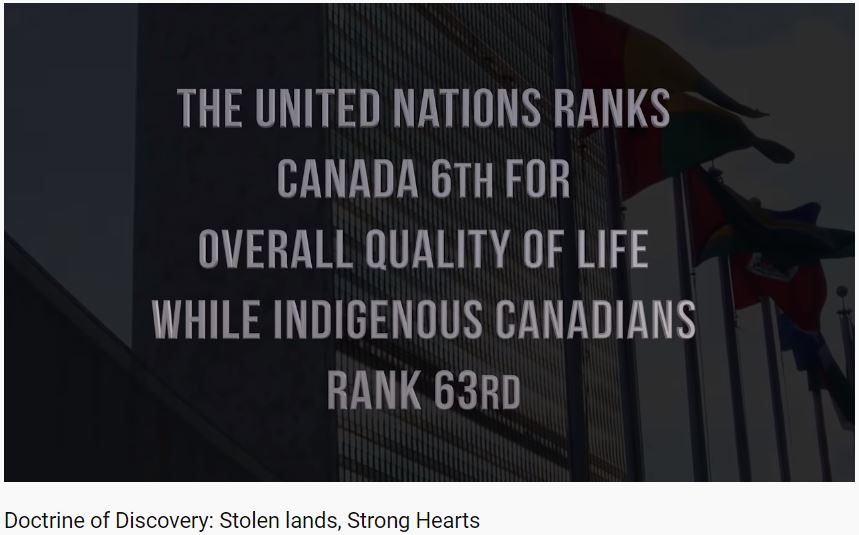Heartbreaking comment by N Donna Wise to the piece posted on Alberta Surface Rights Group Facebook Page [Since removed by ASRG. Why? Today, February 16, 2020, because Ms. Wise’s comment is important, I uploaded the snap I took just after she posted it.]
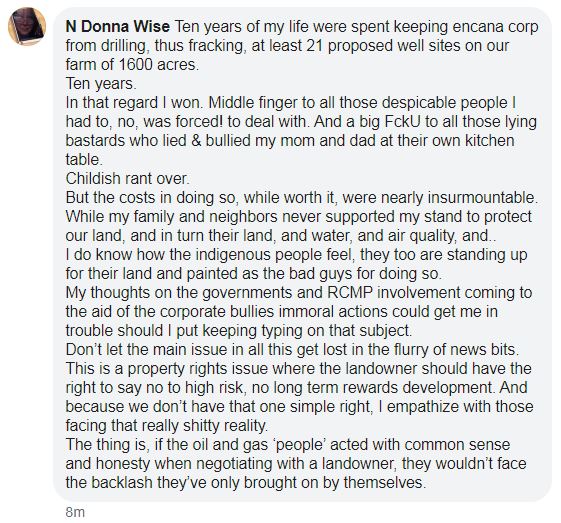
Ten years of my life were spent keeping encana corp from drilling, thus fracking, at least 21 proposed well sites on our farm of 1600 acres.
Ten years.
In that regard I won. Middle finger to all those despicable people I had to, no, was forced! to deal with. And a big FckU to all those lying bastards who lied & bullied my mom and dad at their own kitchen table.
Childish rant over. [Not childish]
But the costs in doing so, while worth it, were nearly insurmountable. While my family and neighbors never supported my stand to protect our land, and in turn their land, and water, and air quality, and..
I do know how the indigenous people feel, they too are standing up for their land and painted as the bad guys for doing so.
My thoughts on the governments and RCMP involvement coming to the aid of the corporate bullies immoral actions could get me in trouble should I put keeping typing on that subject. [Not if many of us talk about it publicly]
Don’t let the main issue in all this get lost in the flurry of news bits. This is a property rights issue where the landowner should have the right to say no to high risk, no long term rewards development. And because we don’t have that one simple right, I empathize with those facing that really shitty reality.
The thing is, if the oil and gas ‘people’ acted with common sense and honesty when negotiating with a landowner, they wouldn’t face the backlash they’ve only brought on by themselves.
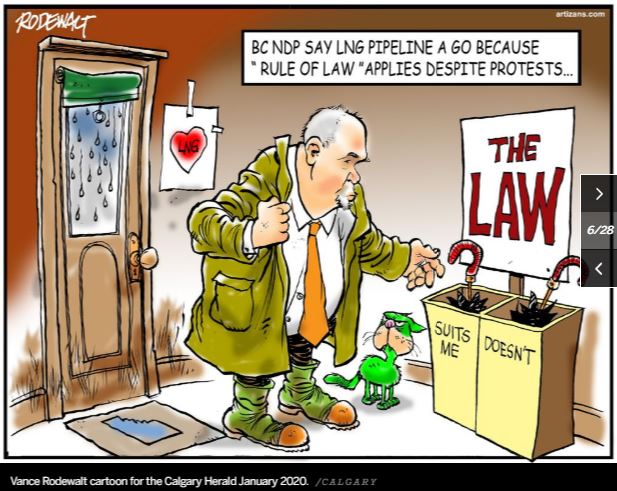
Comment: Whose land? Whose laws? B.C. needs to change its name by Nicholas XEMŦOLTW̱ Claxton and John Price, Feb 12, 2020, Times Colonist
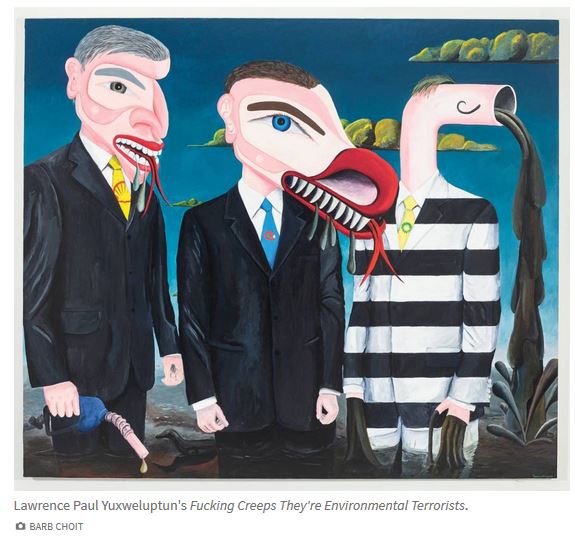
In his amazing 2016 exhibit “Unceded Territories,” Lawrence Paul Yuxweluptun called for the renaming of British Columbia (#RenameBC). Almost all of the province is unceded, he said at the time: “This is why I’m asking for the change, because Canada doesn’t own this province, we’ve never surrendered it. It belongs to all native people in this province and their nations have to be recognized, not British Columbia.”
The struggle of the Wet’suwet’en hereditary chiefs to assert sovereignty over their land highlights the urgency of not only getting rid of “British Columbia,” but also having settlers in this province recognize that the lands they work and play on remain Indigenous, never ceded, never conquered.
From Tyendinaga Mohawk blocking CN Rail near Belleville, Ont., to activists blocking the Port of Vancouver, to Indigenous youth occupying the B.C. legislature, and Gitxsan and Wet’suwet’en blocking CN Rail at Hazelton, a movement on the scale of “Idle No More” is coalescing.
Even the Hospital Employees’ Union, the Longshoreman’s Union and other unions, long the bedrock of NDP support, are stepping up.
Unfortunately, some in the media seem intent on ignoring this important resurgence of Indigenous sovereignty despite the fact the B.C. and Canadian governments are facing a crisis of legitimacy.
First Nations and their supporters are entirely within their rights to rebel, to engage in civil disobedience for there are two sets of laws in this land – Indigenous law and settler law. Today, settler law stands on trial, and Indigenous law fully backs the Wet’suwet’en hereditary chiefs who are exercising their lawful rights on their territory.
The courts today recognize the validity of Indigenous laws. The courts have also tried to assert the validity of settler laws, but here they stand on shaky ground — that’s why Premier John Horgan’s appeals to “law and order” are so off-base.
All courts, including the Supreme Court of Canada, have ruled that the lands now called “British Columbia” only came under settler (British) control in 1846 with the signing of what is known as the Treaty of Oregon. That treaty was signed by the British and American governments — not with First Nations even though they outnumbered non-Indigenous people at the time 1,000 to 1. The treaty was with the United States.
In the discussions leading to the treaty, the only way the British could justify their desire for expansion was to say that Captain Cook and Captain Vancouver had discovered “British Columbia.” Such assertions, known today as the Doctrine of Discovery, have been totally discredited by Indigenous and non-Indigenous peoples the world over.
In its 2007 Tsilhqot’in ruling, the B.C. Supreme Court itself ruled early explorers were engaged in actions no better than “Captain Vancouver’s act of imperialism.” If the judges had bothered to read the content of the negotiations justifying the Treaty of Oregon, they might have realized that to suggest the Treaty of Oregon provides any basis to Crown sovereignty is like arguing “Columbus discovered America”!
To make matters worse, it is well-known that B.C. was the “bad boy” of Confederation. After joining Canada in 1871, the legislature of white men, representing a minority of white settlers, passed laws taking away the right to vote of the estimated 40,000-plus First Nations and Chinese then in the province. Though the attorney general of B.C. said that such an action was racist, none other than John A. Macdonald authorized it.
The B.C. government then refused to even discuss treaties with First Nations, even lobbying the federal government to impose a ban on First Nations going to court from 1927 on.
First Nations sovereignty over their territories does exist and much can be learned from their traditions. For W̱SÁNEĆ peoples, terms such as as TEṈEW̱ and NEHIMET, or for Nuu-chah-Nulth peoples terms such ḥahuułi and ḤuupuKʷanum continue to represent spiritual and legal beliefs founded on an organic sense of being in which people do not own the earth but rather belong to it.
Thanks to the Wet’suwet’en hereditary chiefs, we now know that they too retain similar concepts in terms such as Anuc’nu’at’en.
As the protests spread, wherever they take place, we hope First Nation band councils will step forward to support the Wet’suwet’en hereditary chiefs, protecting the protesters by asserting the Nations’ laws, shielding the protesters in a cone of love and respect. Municipal councils can follow suit, support the protests, and stop the provincial and federal governments from trashing UNDRIP and any possibility for reconciliation.
In the name of Indigenous law, let us make things right — for the land and for the generations to come.
Nicholas XEMŦOLTW̱ Claxton teaches in the University of Victoria’s Faculty of Human and Social Development and is elected chief of the Tsawout First Nation. John Price is UVic professor emeritus (history). They recently published “Whose Land Is it? Rethinking Sovereignty in British Columbia,” in B.C. Studies.
Refer also to:
Lawrence Paul Yuxweluptun evokes a spectrum of emotions with ‘Unceded Territories’
… “This is a very racist country.” [Yuxweluptun] thinks reserves, which he describes as “internment camps”, should be abolished, and says the Indian Act should be called “the White Supremacy Act”.
… The show’s subtitle, Unceded Territories, reveals one of Yuxweluptun’s major preoccupations: what he sees as a profoundly flawed land-claims process in a province whose First Nations peoples had never negotiated treaties with the federal government.
“We’ve never surrendered anything,” he says. “Land claims mean that, once and for all, we have to extinguish our rights.” Then he adds, “They’re sitting around talking millions? The land is worth trillions. So why are our chiefs even talking to the provincial government?”
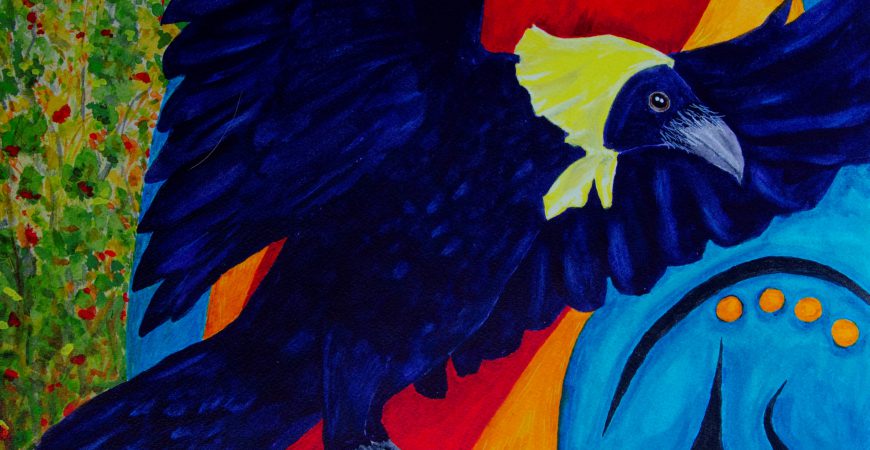
Painting by Val Napoleon
